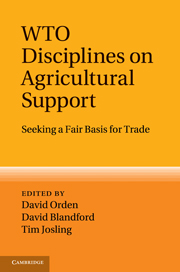Book contents
- Frontmatter
- Contents
- List of figures
- List of tables
- Notes on contributors
- Preface
- List of acronyms
- PART I overview of domestic support issues and WTO rules
- 1 Introduction
- 2 The WTO disciplines on domestic support
- PART II Developed countries: have high levels of support come down?
- PART III Developing countries: will low levels of support rise?
- PART IV Looking forward: can fair markets be achieved?
- Appendix A Domestic support provisions of the Agreement on Agriculture
- Appendix B Domestic support provisions of the Doha draft modalities
- Index
- References
1 - Introduction
Published online by Cambridge University Press: 11 April 2011
- Frontmatter
- Contents
- List of figures
- List of tables
- Notes on contributors
- Preface
- List of acronyms
- PART I overview of domestic support issues and WTO rules
- 1 Introduction
- 2 The WTO disciplines on domestic support
- PART II Developed countries: have high levels of support come down?
- PART III Developing countries: will low levels of support rise?
- PART IV Looking forward: can fair markets be achieved?
- Appendix A Domestic support provisions of the Agreement on Agriculture
- Appendix B Domestic support provisions of the Doha draft modalities
- Index
- References
Summary
One of the more innovative achievements associated with the conclusion of the Uruguay Round of trade negotiations in 1994 was the introduction of a multilateral architecture of rules and commitments disciplining domestic support measures for agriculture. These rules are contained in the Agreement on Agriculture, one of a number of agreements attached to the Marrakesh Treaty that established the World Trade Organization (WTO). As stated in the preamble, to achieve the long-term objective of establishing “a fair and market-oriented agricultural trading system” the WTO members sought “to provide for substantial progressive reductions in agricultural support and protection sustained over an agreed period of time, resulting in correcting and preventing restrictions and distortions in world agricultural markets.” The rules and commitments on domestic support are particularly important in this context because of the market-distorting effects of many of the policy measures countries have enacted. In addition, without constraints on domestic support it is hard to envision success in multilateral negotiations to reduce agricultural tariffs, as some countries provide support for their farmers primarily through domestic measures while others rely more heavily on border protection.
Further discussions were initiated in 2000 under a clause of the Agreement on Agriculture that committed the members to continued negotiations on lowering support and protection. When a full new round of trade negotiations – the Doha Round – was launched in 2001, the agricultural negotiations were incorporated into it.
- Type
- Chapter
- Information
- WTO Disciplines on Agricultural SupportSeeking a Fair Basis for Trade, pp. 3 - 22Publisher: Cambridge University PressPrint publication year: 2011
References
- 2
- Cited by

